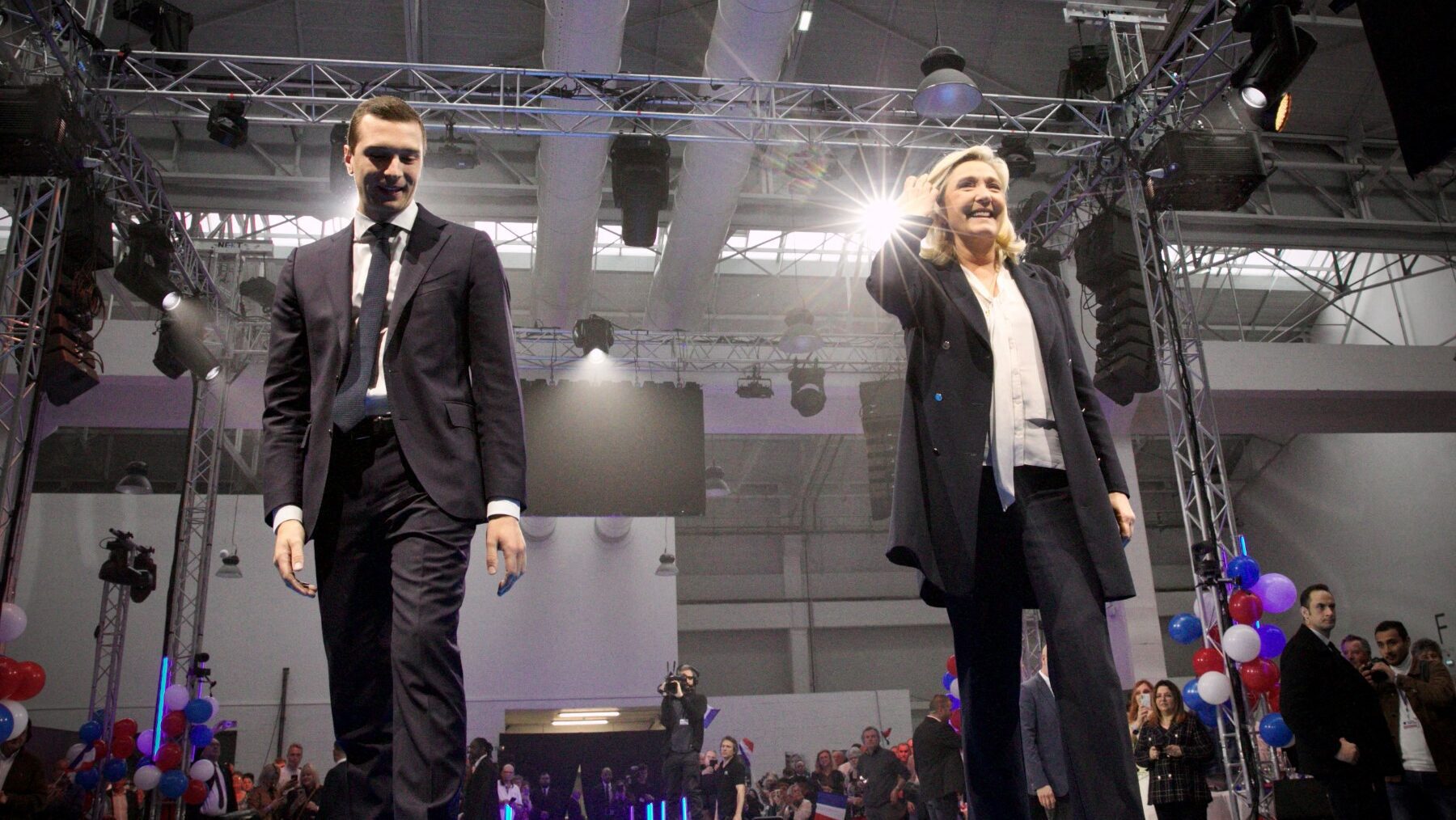
French Rassemblement National (RN) party President Jordan Bardella (L) and National Assembly parliamentary group President Marine Le Pen take to the stage during the event “La Fete de la Nation” (Celebration of the Nation) in Le Havre, northern France, on May 1, 2023.
Photo: Lou BENOIST / AFP
For several weeks, Jordan Bardella, the 28-year-old chairman of the Rassemblement National, has been making a name for himself in the French media, to the point of challenging the popularity of the party’s most public figure—Marine Le Pen. The question remains whether it is the fruit of fierce competition or a concerted strategy.
The recent terrorist crimes and attacks as well as the debates surrounding the immigration reform bill gave the Rassemblement National the opportunity to make regular media appearances on issues that are at the heart of the programme of France’s storied national right-wing party.
During the tragic attack in Crépol, which claimed the life of Thomas, a young boy, Jordan Bardella focused his media comments in two directions: condemnation of an attack by ‘youths from the suburbs’ motivated by anti-white racism, but also condemnation of the ‘ultra-right’ militants who came to demonstrate in memory of Thomas’ death. On this issue, Jordan Bardella may have given the impression that he was firing on his own side, prompting hostile reactions from right-wing activists. But this stance, designed to set the Rassemblement National apart from its main competitor, Éric Zemmour’s party Reconquête, has enabled the president of the Rassemblement National to present a moderate yet firm image that appeals to a large proportion of public opinion.
For several months, one opinion poll after another has shown a sharp rise in Jordan Bardella’s popularity among the French public. Despite his youth—he is only 28—he is increasingly emerging as a key figure in the political debate. The president of the Elabe polling institute attributes his meteoric rise to the Lampedusa migration crisis in the summer of 2023. In October, a poll conducted by the business newspaper Les Échos put him in the top ten of the French people’s favourite politicians for the first time, placing him in 4th place with 28% favourable opinions, ahead of Interior Minister Gérald Darmanin. In mid-December, a new poll conducted for Sud Radio confirmed the trend, with 44% in favour, and for the first time, he came in ahead of Marine Le Pen, who had 43% in favour in this poll.
At the time of the debates on the immigration law and the vote on the motion to reject the government’s bill, which the Rassemblement National considered too lax, the party established itself as a key player in the political debate, since no majority, for or against, was possible without the votes of the Rassemblement National.
In the aftermath of the motion, rumours arose about the possibility of dissolving the National Assembly if no political compromise could be found. This rumour recurs regularly in the French media, given the difficult position in which the government finds itself, with no majority in the National Assembly to pass laws and still having to hold out until the spring of 2027. Dissolution is unlikely, as new elections would probably further weaken the government camp and benefit the Rassemblement National.
Against this backdrop, Jordan Bardella said he was in favour of dissolution. He spoke on radio and television about the prospect of a victory for the RN in the event of an early general election. He said he was ready to exercise power and therefore potentially become prime minister if the result of the elections put the Rassemblement National in the lead—which, at this stage, is still highly unlikely. “We are ready not only to return to the French people, but also to govern France,” he told RMC radio. Nearly half of French people think he would be a “good prime minister,” according to an Elabe poll for BFMTV.
In making these ambitious remarks, does the young leader of the Rassemblement National, who will head his party’s list for the 2024 European elections, intend to outdo the party’s historical figure and leader of the RN parliamentary group in the National Assembly, Marine Le Pen? This hypothesis is the stuff of political commentators’ delight, but for the moment it is out of the question. Since September, he has been making repeated pledges of loyalty to the woman who has already positioned herself as the party’s candidate for the 2027 presidential elections.
Le Pen, it was revealed in an interview on December 26th, has her eyes set on the presidency.
“Marine Le Pen does not want to govern France,” said RN spokesman Julien Odoul, “she wants to preside over France. She will be our candidate for the next presidential election of 2027.”
The promotion of Jordan Bardella as a potential prime minister is, in fact, part of a concerted strategy between the two figures of the Rassemblement National. Shortly before Christmas Le Figaro reported that Marine Le Pen told Bardella: “Prepare your government”—either in the event of a dissolution, or for 2027, whichever comes first.
